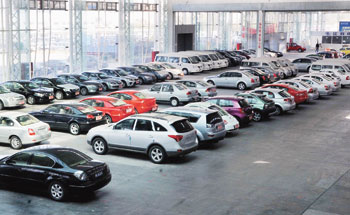AB Mat,Round Head Mat,Sharp Point Mat Jiangsu Laiao Material Technology Co., Ltd. , https://www.laiaomaterial.com The international environment is not optimistic, and the domestic situation has changed dramatically. In September this year, sales volume of domestic foreign-funded passenger vehicle manufacturers fell by 5.2%, which was the second decline in the year except January, and it was also the first time in recent years that the "Jinjiu" has experienced a decline. Here we look at the specific auto market situation through domestic and foreign-owned passenger vehicle sales reports.
The international environment is not optimistic, and the domestic situation has changed dramatically. In September this year, sales volume of domestic foreign-funded passenger vehicle manufacturers fell by 5.2%, which was the second decline in the year except January, and it was also the first time in recent years that the "Jinjiu" has experienced a decline. Here we look at the specific auto market situation through domestic and foreign-owned passenger vehicle sales reports.
According to relevant data, from January to September this year, cumulative sales of 16 domestically-owned foreign-owned enterprises (excluding microbuses, the same below) achieved rapid growth, a year-on-year increase of 10.2% to 6.7249 million vehicles. In September, sales totaled 757,200 units, a year-on-year decline of 5.2%. This was the second decline in the year in addition to January (due to the New Year holiday), and it was the first time in recent years that the gold nine has declined. The most important reason was that it was dragged down by the sharp decline in the sales volume of Japanese automakers.
September <br> <br> Japanese car companies overall decline in sales of over four percent in September this year, by the impact of the wave of anti-Japanese Diaoyu Islands, Japanese-made car sales have fallen sharply, down 41.3% year on year to 157,000, only lower than the German, At the same time, it is also lower than the American car. Among them, the slowest decline was Mitsubishi, which saw sales fall by 60% (59.7%) to 1,581 units in September this year. Followed by Nissan, sales fell 47.2% to 43,000 vehicles. Sales of Toyota, Honda, and Suzuki all slid to around 40% - they dropped 38.4%, 41.2% and 41.8%, respectively. Compared with other Japanese car companies, Mazda's sales fell the lowest. In September this year, sales fell 22.7% year-on-year.
Germany and the US Department of car sales benefit the most <br> <br> Ashkenazi, the US Department of Korea University and law are to achieve sales growth. Among them, the sales growth of the U.S. and German companies is the fastest. In September of this year, sales increased by 16.5% and 12.9% year-on-year to 172,000 units and 252,500 units respectively. Korean and French sales increased by 9.1% and 9.2% to 127,400 units and 116,800 units respectively.
Modern sales of 84,200 units are lower than those of Volkswagen and General Motors. The sales of Volkswagen's mass sales increased by 10.6% year-on-year to 230,300 units in September this year. Followed by the US Department of General Motors, sales increased by 7.6% year-on-year to 128,500 vehicles. The third highest sales volume is the modernization of the Korean system. Its sales in September this year increased by 14.9% year-on-year to 84,200 vehicles, which exceeded Toyota and Nissan. And it sold 73,300 units in the same period last year, which is lower than Toyota (81,500) and Nissan (81,400).
Ford sold 43,500 vehicles in September this year, an increase of 54.7% year-on-year. BMW and Daimler increased by 43.9% and 41.6% year-on-year to 125,000 units and 9691 units respectively.
January-September: German sales increased by more than two percent over the Japanese period in January-September, and domestic sales of foreign-made cars all increased. Among them, German car sales grew fastest, an increase of 20% (20.2%) year-on-year to 21.045 million vehicles, also surpassing Japanese. The Japanese car sales growth was the lowest, and the sales volume only increased by 2.2% year-on-year to 2,209,100 vehicles, which was lower than that in Germany. The sales of the U.S., Korean, and legal systems increased by 9.0%, 9.1%, and 7.1% respectively.
From a branch point of view, of the domestically-made foreign-invested car companies, only Japanese “three-small†companies—Suzuki, Mazda, and Mitsubishi’s sales declined from January to September, both of which fell in double-digit numbers, while other companies’ sales increased; BMW's sales increased by more than 50% (50.8% year-on-year to 117,300 units), the fastest growth.
From January to September this year, the highest-selling mass sales of foreign-funded enterprises increased by 18.8% year-on-year to 1,922,800 units. General Motors sales increased by 7.8% to 1.0323 million units.
Note:
1. All the sales in this article refer to the wholesale sales of domestic foreign-owned brands of narrow-minded passenger cars (sedans, SUVs, and MPVs) by foreign-invested car manufacturers.
2. The concept of Guangzhou Automobile Honda S1 is a joint venture independent brand, which is not within the scope of the "foreign brand" referred to in this article. Similarly, SAIC-GM-Wuling's Baojun 630, Wuling brand microbus, Dongfeng Nissan Kaichen D50 and Dongfeng Honda Siming have not been included in the statistics.
3. All exports of Jazz produced by Honda (China) are not included in the Honda sales described in this article.
September 2012 Domestic Domestic and Foreign Investment in Passenger Vehicles